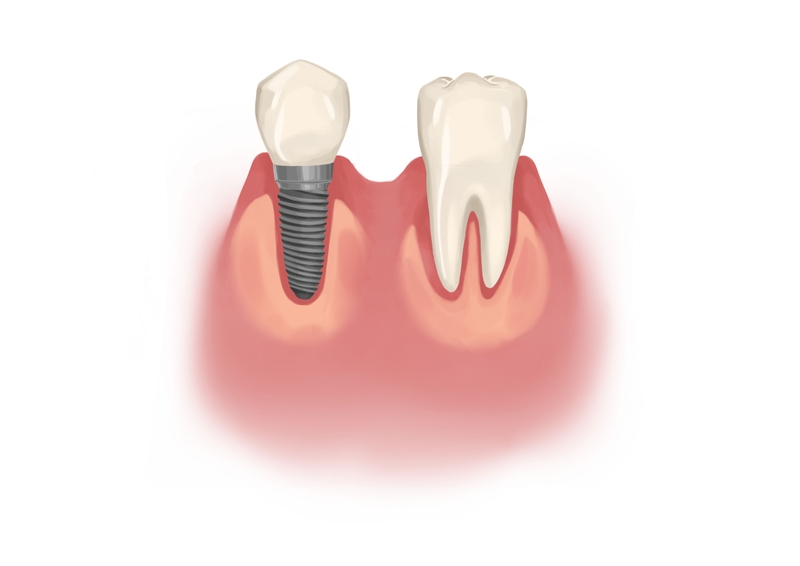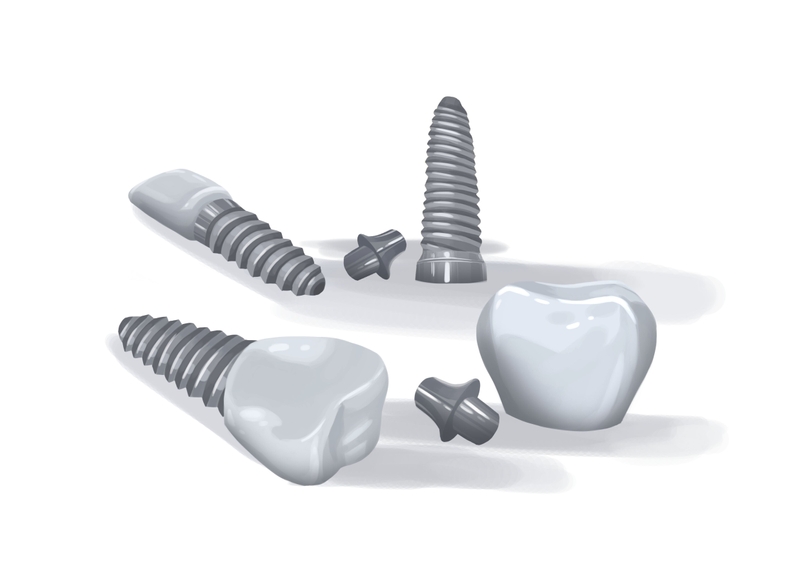- Dental implant failure may occur early or late after the surgery. It causes a number of complications, ranging from infection and micromovement to rejection of dental implants and protrusion into the sinus cavity.
- Improper post-operative care, smoking, bruxism, poor oral hygiene, and gum disease are some of the many risk factors.
- Difficulty chewing or swallowing, gum inflammation and recession, swelling or bleeding around the implants, and discomfort may be signs of dental implant failure.
Restore your smile, reclaim your confidence. Use Authority Dental to book a dentist that do dental implants in your city. It's simple, fast and reliable.
Do you suspect that there may be complications with your dental implant? Here's everything you need to know.
Dental implant failure causes

Picture by Authority Dental under CC 2.0 license
Implants can fail at an early or late stage. The first is categorized as implants that have not successfully osseointegrated yet. The latter can happen even 10 years after the placement surgery.
Here are the most common causes of dental implant failure:
Early
Infection
Micro-movements
Sub-optimal implant positioning
Insufficient bone support
Allergic reaction
Lack of adherence to post-op instructions
Complications after immediate loading
Late
Infection
Nerve or tissue damage
Dental implant rejection
Protruding into the sinus cavity
Injury
The probability of an implant failure depends on several risk factors. There are both patient-oriented ones and ones out of your control. The most common ones are:
Not adhering to proper aftercare,
Bruxism,
Poor oral hygiene,
Choosing overdenture restorations,
Bone grafting with sourced material,
Placement in the maxilla rather than the mandible,
Non-cylindrical shape of the implant,
Taking certain medications, and
Some medical conditions, like rheumatoid arthritis and diabetes.
Smokers have a dental implant failure rate reaching 20%. This is because substances in cigarettes can constrict blood vessels, reducing blood flow. This way, smoking makes healing slower and infections more likely.

Gum disease must be treated before the implant process can begin, but this condition has a tendency to come back. Those with a history of periodontitis have a higher chance of losing their implant if they don’t do everything they can to prevent relapse.
Overdenture restorations are dentures mounted on 2 or 4 implants. Due to their removable nature, they are more likely to suffer damage than permanent solutions.
Bone grafting is a great way to improve implant success; however, it seems to work better when bone is sourced from the patient rather than from a donor.
It has been proven that some medicines, including anxiety or heartburn drugs, can lead to implant loss. This is because they can reduce the rate of bone growth. Each year of taking antidepressants doubles the risk of failure.
Signs of dental implant failure
Some things make it easy to spot dental implant failure. Your dentist, however, is the expert in diagnosing the issue. Make sure to visit the dental office regularly to keep things in check. Here is a list of signs that are cause for concern:
difficulty chewing or swallowing,
gum inflammation,
swelling or bleeding around the implant area,
loosening of the rod, and
severe pain or discomfort.
Lee warns: "The key early indicators I've seen in my practice are not pain, but rather subtle changes around the gumline: bleeding when brushing or flossing, localized swelling or redness that doesn't go away, and the development of a persistent metallic or bad taste."
"If a patient waits for the implant to feel loose, they've waited too long, as mobility indicates significant bone loss has already occurred. This is why regular professional hygiene and X-rays are mandatory," he adds.
Remember that you should look for dental implant failure symptoms when your mouth has fully healed. A few of these may also be regular post-operative symptoms that occur often during the implant recovery period.
Seek an emergency oral surgeon near you for urgent dental care if you feel severe pain.
Failed dental implant options

Picture by Authority Dental under CC 2.0 license
A failed implant is one that has to be removed. When bone loss around the area is large, it may not have to be done with extensive surgery. Removing such an implant is similar to a tooth extraction. One way or another, the patient has to consider what to do next.
Often, a new implant can be placed. You may need 6-8 months of healing before this can be done. What’s more, if implant loss was caused, even just in part, due to bone resorption, you will need bone grafting or sinus lifting. These procedures also come with their periods of healing.
Re-implanted implants have a much better chance at survival as long as the cause for the initial failure is known. Adjustment to error can be applied, thus making the second rod more optimal.
If, for some reason, you are not a good candidate for dental implant failure treatment, you can consider a bridge or denture. That might still take some time, as gums may have to heal before a cast is taken and before you can start wearing the new restoration.

FAQ
What is the failure rate of dental implants?
The dental implant failure rate is about 5%.
While looking at failed dental implant pictures may discourage you from the procedure, keep in mind these are only 5 out of 100 cases. Moreover, failures are usually caused by patient-oriented factors. Following aftercare instructions significantly lowers the risk.
Can a failed dental implant be replaced immediately?
It depends on how much bone is left in the jaw and how much was removed. Usually, early failures can simply be unscrewed without any damage. In these cases, implants can often be replaced immediately.
If there was bone loss while the implant was still in place or if much was removed, you might require grafting. That includes several months of healing before a new rod can be inserted.
Can the same tooth implant fail several times?
Whether an implant can be replaced at all depends on the reason it failed in the first place. In cases such as allergic reactions, implants made of different materials can usually be installed. If there was a severe infection due to patient-oriented risk factors such as smoking or a history of periodontitis, it might not be possible.
It is up to the dentist to decide whether the patient is a good candidate for replacement.
Is a dental implant failure refund possible?
You may be entitled to a refund only if the cause of failure had something to do with malpractice or a mistake on the part of the implantologist. Most often, though, the reason is patients' smoking or not conducting proper oral hygiene.
How to prevent failure of dental implants?
The best way to prevent failure of a dental implant is to plan the treatment out properly. In order for your dentist to be able to do that, you must be completely honest about your condition. Let him or her know about your full medical history, habits, and any medication you are taking.
Stick to proper aftercare after your initial surgery. When your implant is in place, practice excellent oral hygiene. Brush and floss your teeth, ideally after every meal. Use mouthwash to rinse out any food debris and keep your breath fresh. See your dentist for routine exams.
Harry Lee, DMD
When patients ask me about the signs of dental implant failure, I explain that it's rarely a dramatic, sudden event. The failure process is typically quiet, beginning with a condition called peri-implantitis, which mimics gum disease. The most critical insight I stress is that a successful implant should be entirely silent and still. Any deviation from that silence is a red flag.